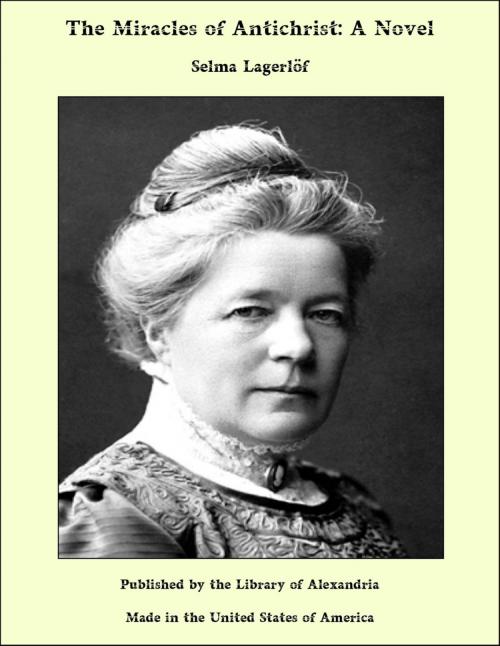The Miracles of Antichrist: A Novel
Nonfiction, Religion & Spirituality, New Age, History, Fiction & Literature| Author: | Selma Lagerlöf | ISBN: | 9781465615497 |
| Publisher: | Library of Alexandria | Publication: | March 8, 2015 |
| Imprint: | Language: | English |
| Author: | Selma Lagerlöf |
| ISBN: | 9781465615497 |
| Publisher: | Library of Alexandria |
| Publication: | March 8, 2015 |
| Imprint: | |
| Language: | English |
It was at the time when Augustus was emperor in Rome and Herod was king in Jerusalem. It happened once upon a time that a very great and holy night sank down over the earth. It was the darkest night ever seen by man; it seemed as if the whole earth had passed under a vault. It was impossible to distinguish water from land, or to find the way on the most familiar paths. And it could not be otherwise, for not a ray of light came from the sky. All the stars stayed in their houses, and the fair moon kept her face turned away. And just as intense as the darkness was the silence and the calm. The rivers stood still in their course; the wind did not stir, and even the leaves of the aspen ceased to tremble. Any one walking by the sea would have found that the waves no longer broke on the shore, and the sand of the desert did not crunch under the wanderer’s foot. Everything was as if turned to stone and without motion, in order not to disturb the holy night. The grass did not dare to grow, the dew could not fall, and the flowers feared to exhale their perfume. During that night the beasts of prey did not hunt, the serpents did not sting, the dogs did not bay. And what was even more wonderful, none of the inanimate things would have disturbed the holiness of the night by lending themselves to an evil deed. No false key could open a lock, and no knife could shed blood. In Rome, on that very night, a little group of people came down from the emperor’s palace on the Palatine and made their way over the Forum to the Capitol. During the day just completed his councillors had asked the emperor if they might not raise a temple to him on Rome’s holy mountain. But Augustus had not immediately given his consent. He did not know if it would be pleasing to the gods for him to possess a temple next to theirs, and he had answered that he wished first to discover by a nocturnal sacrifice to his genius what their wishes were. Followed by a few faithful retainers, he was now on his way to perform that sacrifice. Augustus was carried in his litter, for he was old, and the long stairs to the Capitol fatigued him. He held the cage of doves which was his offering. Neither priests, nor soldiers, nor councillors accompanied him; only his nearest friends. Torch-bearers walked in front of him, as if to force a way through the darkness of the night, and behind him followed slaves, carrying the tripod, the charcoal, the knives, the holy fire, and everything needed for the sacrifice. On the way the emperor chatted gayly with his retainers, and none of them noticed the infinite silence and calm of the night. It was only on reaching the open place on the top of the Capitol, which had been thought of for the new temple, that it was revealed to them that something unusual was occurring.
It was at the time when Augustus was emperor in Rome and Herod was king in Jerusalem. It happened once upon a time that a very great and holy night sank down over the earth. It was the darkest night ever seen by man; it seemed as if the whole earth had passed under a vault. It was impossible to distinguish water from land, or to find the way on the most familiar paths. And it could not be otherwise, for not a ray of light came from the sky. All the stars stayed in their houses, and the fair moon kept her face turned away. And just as intense as the darkness was the silence and the calm. The rivers stood still in their course; the wind did not stir, and even the leaves of the aspen ceased to tremble. Any one walking by the sea would have found that the waves no longer broke on the shore, and the sand of the desert did not crunch under the wanderer’s foot. Everything was as if turned to stone and without motion, in order not to disturb the holy night. The grass did not dare to grow, the dew could not fall, and the flowers feared to exhale their perfume. During that night the beasts of prey did not hunt, the serpents did not sting, the dogs did not bay. And what was even more wonderful, none of the inanimate things would have disturbed the holiness of the night by lending themselves to an evil deed. No false key could open a lock, and no knife could shed blood. In Rome, on that very night, a little group of people came down from the emperor’s palace on the Palatine and made their way over the Forum to the Capitol. During the day just completed his councillors had asked the emperor if they might not raise a temple to him on Rome’s holy mountain. But Augustus had not immediately given his consent. He did not know if it would be pleasing to the gods for him to possess a temple next to theirs, and he had answered that he wished first to discover by a nocturnal sacrifice to his genius what their wishes were. Followed by a few faithful retainers, he was now on his way to perform that sacrifice. Augustus was carried in his litter, for he was old, and the long stairs to the Capitol fatigued him. He held the cage of doves which was his offering. Neither priests, nor soldiers, nor councillors accompanied him; only his nearest friends. Torch-bearers walked in front of him, as if to force a way through the darkness of the night, and behind him followed slaves, carrying the tripod, the charcoal, the knives, the holy fire, and everything needed for the sacrifice. On the way the emperor chatted gayly with his retainers, and none of them noticed the infinite silence and calm of the night. It was only on reaching the open place on the top of the Capitol, which had been thought of for the new temple, that it was revealed to them that something unusual was occurring.















